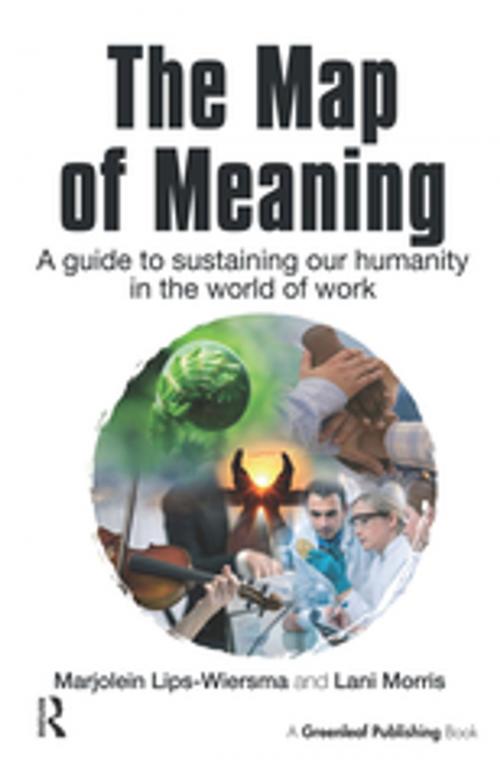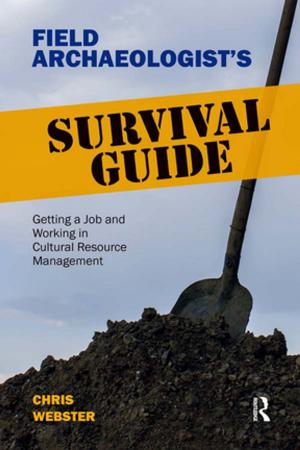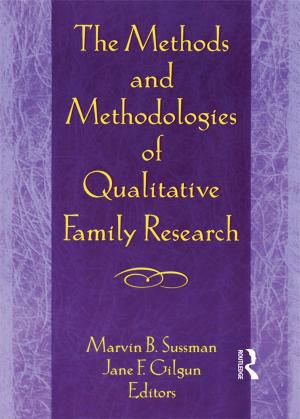The Map of Meaning
A Guide to Sustaining our Humanity in the World of Work
Business & Finance, Business Reference, Business Ethics| Author: | Marjolein Lips-Wiersma, Lani Morris | ISBN: | 9781351278027 |
| Publisher: | Taylor and Francis | Publication: | September 8, 2017 |
| Imprint: | Routledge | Language: | English |
| Author: | Marjolein Lips-Wiersma, Lani Morris |
| ISBN: | 9781351278027 |
| Publisher: | Taylor and Francis |
| Publication: | September 8, 2017 |
| Imprint: | Routledge |
| Language: | English |
This book introduces a "Map of Meaning" called the Holistic Development Model, which provides a clear, simple and profound framework of the dimensions and process of living and working meaningfully.Like all reliable maps this one has been carefully tested. It is based on over 15 years' research into the insights and practice of ordinary people. Although the authors borrow from the work of philosophers, psychologists and sociologists to provide evidence and context for their ideas, the main contribution of this book is that it describes how ordinary human beings wrestle with, and give answers to, the questions of "What is meaningful work and a meaningful life?" This innate human knowledge is captured in a practical model that makes understanding and working with issues of meaning clear and accessible to everyone.At an individual level this book helps people to define and stay in contact with what is most important to them as they grapple with the real problems of daily life and suggests how they can stay in charge of keeping the human search for meaning alive, especially in the face of the challenges that exist in organizational life. The authors recognize that in the current economic context a simple map of meaning is essential, precisely because organizational life has become so intensely directed towards a singular economic goal. They argue that it is vital that people have a simple and powerful way to reclaim the significance of meaning in their working lives.There are numerous studies that show conclusively that meaningful work, or its absence, influences some important outcomes in organizational life such as motivation, absenteeism, work behaviour, engagement, job satisfaction, empowerment, stress and performance. But people's humanity and search for meaning, so often compromised at work, is not something that can be mechanised by the latest self-help or managerial technique. It is not something that can be picked up and dropped as convenient. The authors argue that being human is not a fad. Being human is enduring and needs to be taken seriously. Creating meaningful work, therefore, leads to many desired organizational outcomes, but implementing it does require the courage to question some fundamental ways of thinking about business and the integrity to engage with the issues sincerely. At an organizational level this book offers many practical examples of how to build and maintain workplaces that are meaningful to people.The idea that there is a parallel between the meanings, decision-making dynamics and actions of individuals and organizations is central to the structure of this book. It therefore addresses meaning at both individual and organizational level and in the dynamic between them. This is neither a self-help book, nor an organizational systems book; its strength is that it draws together the aspirations of individuals with those of the organizations in which they work.At the same time, this is not a naïve book. One of the strengths of the Holistic Development Model is that it takes tensions, paradoxes and imperfections as a given. They are part of being human and they are part of organizations. The book is not only about the importance of living meaningfully, it is about how to do it. The book is full of stories of people who have worked with the model. They demonstrate the versatility of the model and how it helps them to analyse, speak to, plan around and respond to an enormous variety of everyday issues and situations. It is this resourcefulness the authors would like readers to get from this book and have at their fingertips.This book is primarily written for anyone, from a CEO to a blue-collar worker or consultant, who is interested in creating more meaning and purpose in work and organizations, and who would like to better understand how to get others on board. It is for those searching for ways to re-energize their roles or change their careers. It is for anyone who firmly believes that it must be possible to align our deeper life purposes with our daily actions in the workplace.
This book introduces a "Map of Meaning" called the Holistic Development Model, which provides a clear, simple and profound framework of the dimensions and process of living and working meaningfully.Like all reliable maps this one has been carefully tested. It is based on over 15 years' research into the insights and practice of ordinary people. Although the authors borrow from the work of philosophers, psychologists and sociologists to provide evidence and context for their ideas, the main contribution of this book is that it describes how ordinary human beings wrestle with, and give answers to, the questions of "What is meaningful work and a meaningful life?" This innate human knowledge is captured in a practical model that makes understanding and working with issues of meaning clear and accessible to everyone.At an individual level this book helps people to define and stay in contact with what is most important to them as they grapple with the real problems of daily life and suggests how they can stay in charge of keeping the human search for meaning alive, especially in the face of the challenges that exist in organizational life. The authors recognize that in the current economic context a simple map of meaning is essential, precisely because organizational life has become so intensely directed towards a singular economic goal. They argue that it is vital that people have a simple and powerful way to reclaim the significance of meaning in their working lives.There are numerous studies that show conclusively that meaningful work, or its absence, influences some important outcomes in organizational life such as motivation, absenteeism, work behaviour, engagement, job satisfaction, empowerment, stress and performance. But people's humanity and search for meaning, so often compromised at work, is not something that can be mechanised by the latest self-help or managerial technique. It is not something that can be picked up and dropped as convenient. The authors argue that being human is not a fad. Being human is enduring and needs to be taken seriously. Creating meaningful work, therefore, leads to many desired organizational outcomes, but implementing it does require the courage to question some fundamental ways of thinking about business and the integrity to engage with the issues sincerely. At an organizational level this book offers many practical examples of how to build and maintain workplaces that are meaningful to people.The idea that there is a parallel between the meanings, decision-making dynamics and actions of individuals and organizations is central to the structure of this book. It therefore addresses meaning at both individual and organizational level and in the dynamic between them. This is neither a self-help book, nor an organizational systems book; its strength is that it draws together the aspirations of individuals with those of the organizations in which they work.At the same time, this is not a naïve book. One of the strengths of the Holistic Development Model is that it takes tensions, paradoxes and imperfections as a given. They are part of being human and they are part of organizations. The book is not only about the importance of living meaningfully, it is about how to do it. The book is full of stories of people who have worked with the model. They demonstrate the versatility of the model and how it helps them to analyse, speak to, plan around and respond to an enormous variety of everyday issues and situations. It is this resourcefulness the authors would like readers to get from this book and have at their fingertips.This book is primarily written for anyone, from a CEO to a blue-collar worker or consultant, who is interested in creating more meaning and purpose in work and organizations, and who would like to better understand how to get others on board. It is for those searching for ways to re-energize their roles or change their careers. It is for anyone who firmly believes that it must be possible to align our deeper life purposes with our daily actions in the workplace.















